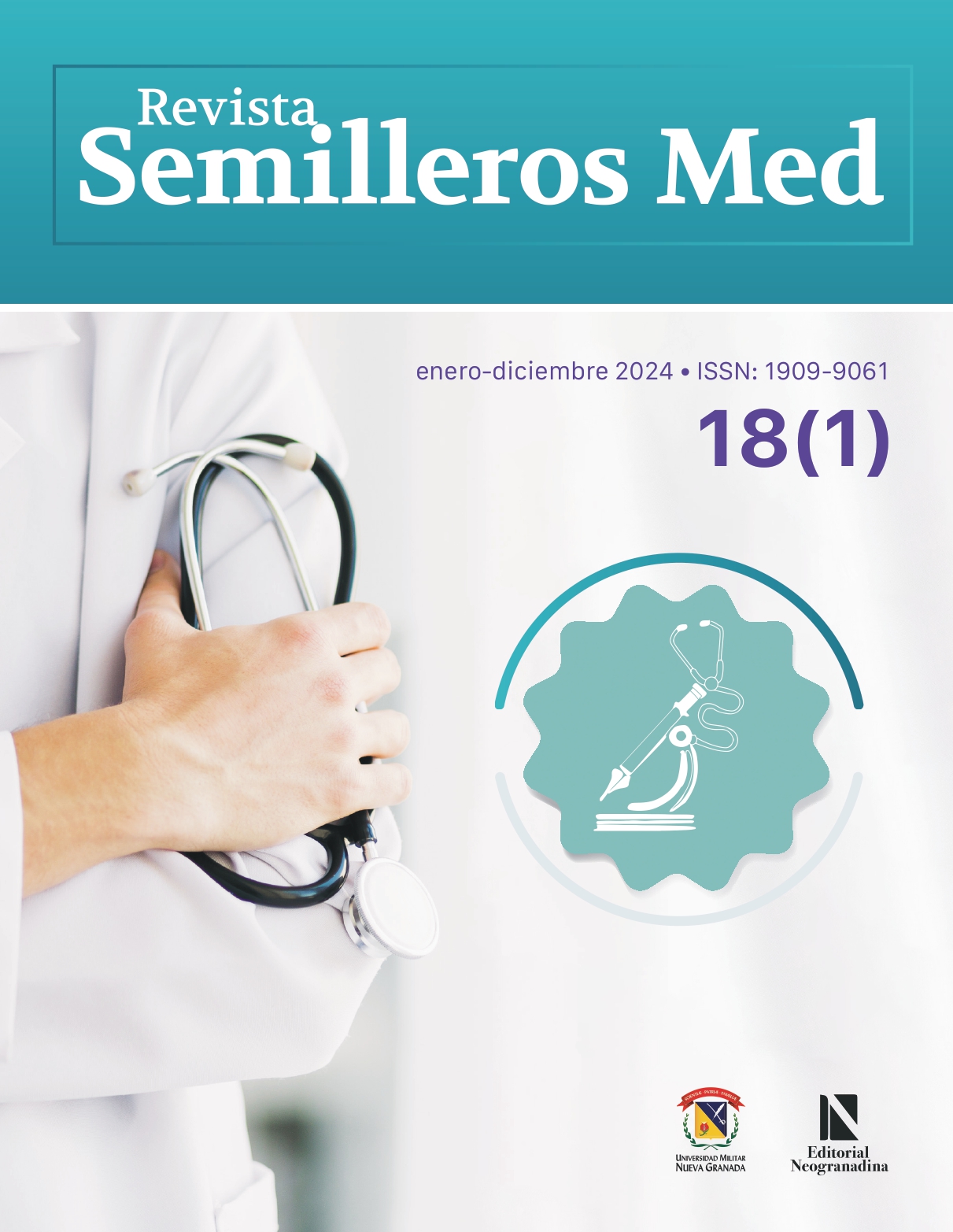Estrategias de seguimiento a pacientes ambulatorios en tiempo real
Resumen
El síndrome metabólico es una condición prevalente caracterizada por factores de riesgo como obesidad abdominal, hipertensión, hiperglucemia y dislipidemia, que incrementan la probabilidad de enfermedades cardiovasculares y diabetes tipo 2. Este estudio presenta una innovadora aplicación móvil, “Estrategias de seguimiento a pacientes ambulatorios en tiempo real”, diseñada para facilitar el monitoreo remoto de glucosa y presión arterial, permitiendo un seguimiento más eficaz de los pacientes con síndrome metabólico. La aplicación almacena datos en la nube y notifica a los médicos cuando los niveles exceden los límites preestablecidos. En una prueba piloto se observó mayor seguridad del usuario al utilizar la aplicación, con una tendencia a mejorar la adherencia al tratamiento, y una reducción de consultas por urgencias. Estos resultados sugieren que la aplicación mejora el control de la enfermedad, puede contribuir a una mejor calidad de vida, y a la disminución de costos de atención médica. Aunque se requieren estudios a mayor escala para validar estos hallazgos, el potencial transformador de esta tecnología en el manejo del síndrome metabólico es considerable.
Referencias bibliográficas
Grundy SM. Metabolic syndrome update. Trends Cardiovasc Med. 2016 may;26(4):364-73. https://doi.org/10.1016/j.tcm.2015.10.004
Alberti KG, Zimmet P, Shaw J. IDF Epidemiology Task Force Consensus Group. The metabolic syndrome--a new worldwide definition. Lancet. 2005 sep. 24-30;366(9491):1059-62. https://doi.org/10.1016/S0140-6736(05)67402-8
Mottillo S, Filion KB, Genest J, Joseph L, Pilote L, Poirier P, et al. The metabolic syndrome and cardiovascular risk a systematic review and meta-analysis. J Am Coll Cardiol. 2010 sep. 28;56(14):1113-32. https://doi.org/10.1016/j.jacc.2010.05.034
Chan JC, Malik V, Jia W, Kadowaki T, Yajnik CS, Yoon KH, et al. Diabetes in Asia: epidemiology, risk factors, and pathophysiology. JAMA. 2009 may. 27;301(20):2129-40. https://doi.org/10.1001/jama.2009.726
Zhang X, Gregg EW, Williamson DF, Barker LE, Thomas W, Bullard KM, et al. A1C level and future risk of diabetes: a systematic review. Diabetes Care. 2010 jul.;33(7):1665-73. https://doi.org/10.2337/dc09-1939
Thomas MC, Brownlee M, Susztak K, Sharma K, Jandeleit-Dahm KA, Zoungas S, et al. Diabetic kidney disease. Nat Rev Dis Primers. 2015 jul. 30;1:15018. https://doi.org/10.1038/nrdp.2015.70
Farmer A, Gibson OJ, Tarassenko L, Neil A. A systematic review of telemedicine interventions to support blood glucose self-monitoring in diabetes. Diabet Med. 2005 oct.;22(10):1372-8. https://doi.org/10.1111/j.1464-5491.2005.01627.x
Grol R, Grimshaw J. From best evidence to best practice: effective implementation of change in patients’ care. Lancet. 2003 oct. 11;362(9391):1225-30. https://doi.org/10.1016/S0140-6736(03)14546-1
Kanai M, Toda T, Yamamoto K, Akimoto M, Hagiwara Y. A mobile health-based disease management program improves blood pressure in people with multiple lifestyle-related diseases at risk of developing vascular disease―a retrospective observational study―. Circ Rep. 2022 may. 31;4(7):322-329. https://doi.org/10.1253/circrep.CR-22-0024
Hamine S, Gerth-Guyette E, Faulx D, Green BB, Ginsburg AS. Impact of mHealth chronic disease management on treatment adherence and patient outcomes: a systematic review. J Med Internet Res. 2015 feb. 24;17(2):e52. https://doi.org/10.2196/jmir.3951
Wang Y, Xue H, Huang Y, Huang L, Zhang D. A systematic review of application and effectiveness of mHealth interventions for obesity and diabetes treatment and self-management. Adv Nutr. 2017 may. 15;8(3):449-462. https:/doi.org/10.3945/an.116.014100
Anderson A, O’Connell SS, Thomas C, Chimmanamada R. Telehealth interventions to improve diabetes management among black and Hispanic patients: A systematic review and meta-analysis. J Racial Ethn Health Disparities. 2022 dic.;9(6):2375-2386. https://doi.org/10.1007/s40615-021-01174-6
Barlow J, Wright C, Sheasby J, Turner A, Hainsworth J. Self-management approaches for people with chronic conditions: a review. Patient Educ Couns. 2002 oct.-nov.;48(2):177-87. https://doi.org/10.1016/S0738-3991(02)00032-0
Golin CE, DiMatteo MR, Gelberg L. The role of patient participation in the doctor visit. Implications for adherence to diabetes care. Diabetes Care. 1996 oct.;19(10):1153-64. https://doi.org/10.2337/diacare.19.10.1153
Fahed G, Aoun L, Bou Zerdan M, Allam S, Bou Zerdan M, Bouferraa Y, et al. Metabolic syndrome: Updates on pathophysiology and management in 2021. Int J Mol Sci. 2022 ene. 12;23(2):786. https://doi.org/10.3390/ijms23020786
Heapy AA, Higgins DM, Cervone D, Wandner L, Fenton BT, Kerns RD. A systematic review of technology-assisted self-management interventions for chronic pain: Looking across treatment modalities. Clin J Pain. 2015 jun.;31(6):470-92. https://doi.org/10.1097/AJP.0000000000000185
Cajita MI, Gleason KT, Han HR. A systematic review of mhealth-based heart failure interventions. J Cardiovasc Nurs. 2016 may.-jun.;31(3):E10-22. https://doi.org/10.1097/JCN.0000000000000305
Smith AJ, Skow Á, Bodurtha J, Kinra S. Health information technology in screening and treatment of child obesity: a systematic review. Pediatrics. 2013 mzo.;131(3):e894-902. https://doi.org/10.1542/peds.2012-2011
Allida S, Du H, Xu X, Prichard R, Chang S, Hickman LD, et al. mHealth education interventions in heart failure. Cochrane Database Syst Rev. 2020 jul. 2;7(7):CD011845. https://doi.org/10.1002/14651858.CD011845.pub2
Cuevas-Fernández FJ, Gómez-López OT, Dorta-Espiñeira M, Farrais-Villalba S, Cabrera de León A, Aguirre-Jaime A. Follow-up of patients with type 2 diabetes during the COVID-19 pandemic: A multicentre study in Primary Care. Semergen. 2023;49(8):102075. https://doi.org/10.1016/j.semerg.2023.102075






